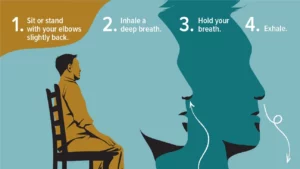Anxiety disorders are the most common mental illness in the United States, affecting 40 million adults in the US every year. While there are many different types of anxiety disorders, they all have one thing in common: they cause a great deal of distress and interference in daily life. If you are struggling with debilitating anxiety, read on for tips and tricks to help you overcome it!
What Is Debilitating Anxiety?
 Debilitating anxiety is a type of anxiety that interferes with your daily life. This is simply described as having intense and irrational fear or worry that doesn’t go away. It can be accompanied by physical symptoms such as sweating, trembling, a racing heart, or feeling dizzy or lightheaded.
Debilitating anxiety is a type of anxiety that interferes with your daily life. This is simply described as having intense and irrational fear or worry that doesn’t go away. It can be accompanied by physical symptoms such as sweating, trembling, a racing heart, or feeling dizzy or lightheaded.
Many people with debilitating anxiety have a hard time completing everyday tasks, such as going to work or school, caring for their families, or even leaving the house. In severe cases, people with this condition may feel like they’re constantly in danger and can’t shake the feeling that something bad is going to happen. Some common symptoms of this condition are listed below:
- Intense and irrational fear or worry
- Physical symptoms such as sweating, trembling, a racing heart, or feeling dizzy or lightheaded
- Inability to complete everyday tasks
- A constant feeling that something bad is going to happen
If you’re struggling with debilitating anxiety, know that you’re not alone. This condition is fairly common, affecting millions of people around the world. While it can be difficult to manage, there are many effective treatments available.
How Can You Overcome Debilitating Anxiety?
If you’re one of the millions of people suffering from debilitating anxiety, you know how difficult it can be to manage. Here are some tips and tricks that may help you find relief:
Talk to your loved ones
It is one of the first and most important steps in managing your anxiety. Talking to your friends or family about what you’re going through can help you feel less alone and more understood. It can also be a helpful way to get support and advice from people who care about you. Because when you share your feelings with someone who understands, it can help to lessen the burden.
You can also try joining a support group for people with anxiety. This can be a great way to meet others who are going through similar experiences. It can also provide you with valuable information and support.
Find a healthy outlet
 Sometimes, anxiety can be a result of built-up stress. Finding an outlet to release that stress can be very helpful in managing your anxiety. There are several different outlets you can try, such as:
Sometimes, anxiety can be a result of built-up stress. Finding an outlet to release that stress can be very helpful in managing your anxiety. There are several different outlets you can try, such as:
- Yoga
- Writing in a journal
- Listen to calm music
- Take a walk in nature
There is no one-size-fits-all solution when it comes to finding an outlet for your stress, so experiment until you find something that works for you. Because it might take some trial and error, it’s important to be patient with yourself.
Identify your trigger
Debilitating anxiety is often caused by a trigger. It could be a certain situation, person, or place. Once you know what your trigger is, you can begin to avoid it or manage it better. It is also important to understand that your trigger may not be the same as someone else’s. For example, someone with a fear of flying may not be able to avoid their trigger, but they can manage it by doing things like meditating or using breathing exercises.
Practice relaxation techniques
Overcoming debilitating anxiety can feel like an insurmountable task, but it is possible to make progress with the right mindset and some effort. One of the most important things you can do is to practice relaxation techniques. This could involve anything from meditation to muscle relaxation exercises. Find what works best for you and make sure to practice regularly.
If you are finding it difficult, then start with small steps and work your way up. For instance, if you are anxious about leaving the house, then start by going outside for a few minutes each day. gradually increase the amount of time you spend outside until you feel more comfortable.
Do deep breathing
 Deep breathing is one of the most effective ways to calm your nervous system and ease anxiety. When you’re feeling anxious, your breathing becomes shallower and faster. This can lead to dizziness, lightheadedness, and a feeling of being disconnected from your body.
Deep breathing is one of the most effective ways to calm your nervous system and ease anxiety. When you’re feeling anxious, your breathing becomes shallower and faster. This can lead to dizziness, lightheadedness, and a feeling of being disconnected from your body.
Deep breathing helps to reverse this process by slowing down your heart rate and promoting feelings of relaxation. To do deep breathing, sit in a comfortable position with your eyes closed. Slowly inhale through your nose, allowing your stomach to expand. Then exhale slowly through your mouth. Repeat this process for several minutes.
Regular exercise
Exercise is a great way to combat anxiety. It releases endorphins, which have mood-boosting effects. A moderate amount of exercise is the key to reaping the benefits without exacerbating symptoms. It is believed that exercise can be as effective as medication in treating anxiety. There are various types of exercises that can help you in overcoming debilitating anxiety, these are:
- Aerobic exercises
- Mindfulness meditation
- Dance
- Yoga
Change your diet
A diet rich in processed foods, unhealthy fats, and refined sugars can increase inflammation throughout the body and trigger anxiety symptoms. Instead, focus on eating whole, unprocessed foods like fruits, vegetables, lean protein, and healthy fats. Also, you should avoid caffeine and alcohol, as they can aggravate anxiety.
Instead, opt for herbal teas like chamomile or lavender tea, which have calming effects. It is believed that omega-three fatty acids can also help to reduce anxiety. In one study, it has been found that people who consume a diet rich in omega-three fatty acids have lower levels of anxiety. You can get omega-three fatty acids from foods like salmon, walnuts, and flaxseeds.
Change your beliefs
 It is also important to change your beliefs about anxiety. A lot of people believe that they should avoid anxious thoughts and situations at all costs. However, this is not the case. In fact, avoiding anxious thoughts can actually make them worse. Instead, you should face your fears head-on. This may seem daunting, but it is essential for overcoming debilitating anxiety.
It is also important to change your beliefs about anxiety. A lot of people believe that they should avoid anxious thoughts and situations at all costs. However, this is not the case. In fact, avoiding anxious thoughts can actually make them worse. Instead, you should face your fears head-on. This may seem daunting, but it is essential for overcoming debilitating anxiety.
Start by making a list of your fears. Then, gradually expose yourself to these fears. For example, if you are afraid of flying, you can start by watching videos about flying. Once you are comfortable with that, you can move on to taking short flights. Eventually, you will be able to fly without any anxiety.
Set aside worry time
Sometimes our minds are just racing and we can’t seem to turn them off. If this is the case, set aside a specific worry time each day, say from _____ pm to _____ pm. During this time you’re allowed to worry about anything and everything that’s on your mind. The rest of the day is off-limits for worrying. This will help to train your mind to focus on the present and not dwell on past or future events.
Also, when you set limits with your worry time, be sure to stick to them. If you find your mind wandering during the day, remind yourself that it’s not a worrying time and redirect your thoughts back to the present.
Seek professional help
Professional help is always a great idea when anxiety becomes too much to handle on your own. A therapist can help you understand and manage your anxiety in a more holistic way. Some common therapies are:
- Cognitive Behavioral Therapy (CBT)
- Exposure therapy
- Acceptance and Commitment Therapy (ACT).
If you’re not sure where to start, ask your doctor for a referral or look for a therapist who specializes in anxiety disorders. It can be the way to finally get your anxiety under control.
All in all, these are some tips to help you start overcoming debilitating anxiety. Remember that everyone’s experience with anxiety is different, so don’t get discouraged if one method doesn’t work for you. Talk to your doctor or a therapist to find an approach that works best for you and stick with it!
Conclusion
In conclusion, debilitating anxiety is considered a serious mental health disorder that should not be taken lightly. If you or someone you know is struggling with debilitating anxiety, there are a number of resources and treatments available. Hence, if you are struggling with debilitating anxiety, don’t hesitate to seek professional help.
Also, do not avoid talking about it with your loved ones. You can also read self-help books, join anxiety support groups, and/or practice relaxation techniques such as yoga or meditation. Remember, you are not alone in this battle against debilitating anxiety. Recovery is possible!
For more information and guidance please get in touch with our expert therapists at Therapy Mantra. They will be more than happy to assist you on your journey to recovery. Contact us today to learn more about our services. You can also book an online therapy session or download our free Android or iOS app.


